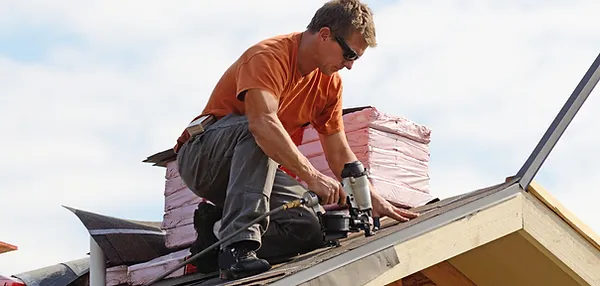In most cases, if you need to replace a roof, it’s because the existing roof is on its last legs, you’re in the middle of a home renovation, or you may have discovered a leak or two. But in the case of an emergency–a tree gets blown into the house for example–you’ll want to know how long it takes to replace a roof.
There is no one way of answering this because there are so many different factors at play. In the above tree example, if there is major structural damage, the timeline to get that new roof will be considerably longer. If it’s just time to get a new roof, there are no other issues, and there is easy accessibility of your roof, the average roof replacement is usually 2-3 days if everything goes smoothly.
Still, there are a lot of considerations. The size of the roof, the materials you’re using, the complexity of the job, the size of the professional roofing crew, and so forth. Let’s take a look at the different factors that go into a roof replacement and what can happen to extend the schedule.
Replacing a Roof Timeline
Replacing a roof is a significant investment in your home, but it’s also a necessary one to protect your property and ensure its longevity. One of the most common questions homeowners have when considering a roof replacement is, “How long will it take?” The answer isn’t straightforward, as several factors influence the timeline of a roof replacement project.
Size, Complexity of the Project
Firstly, the size and complexity of your roof play a crucial role in determining how long the replacement process will take. A small, simple roof with few angles and obstacles will naturally take less time to replace compared to a larger, more intricate roof with multiple peaks, valleys, and other architectural features.
Generally, a straightforward roof replacement for an average-sized home can move along pretty quickly. Single-story homes will go faster than larger homes with two stories just because of the safety factor and the extra work of transporting materials.
Materials
Speaking of materials, what you choose for your new roof impacts the timeline as well. Different roofing materials have varying installation requirements and complexities. For instance, asphalt shingles are typically quicker to install compared to materials like TPO flat roofs or metal roofing, which need labor-intensive methods.
Additionally, specialty roofing materials may take longer to order and receive, which could extend the overall timeline of the project. Architectural or composition shingles are a lot more available than slate tiles.
Scope of the Roof Replacement
The condition of your existing roof and any necessary preparatory work will impact the timeline of the replacement project too. If your old roof needs extensive repairs, such as the replacement of rotted decking or the removal of multiple layers of shingles, it will take longer to prepare the roof for the new materials.
Additionally, any structural modifications or upgrades, such as adding insulation or improving ventilation, will add time to the project but can enhance the performance and longevity of your new roof. If a tree landed on your home, getting trusses made and installed, replacing joists, or rebuilding the framing of the home needs to be taken care of first.
Weather
Weather conditions also play a significant role in the duration of a roof replacement project. Ideally, roofing work should be done during dry, mild weather to ensure the safety of the crew and the integrity of the installation. But we’re in the Pacific Northwest–if we couldn’t handle a little bit of rain, we’d be idle for six months!
Still, torrential rain, snow, high winds, and extreme temperatures can all delay the roofing process, as they pose safety hazards and can affect the quality of the workmanship. Contractors may need to reschedule workdays or take extra precautions to protect the work site during inclement weather, which could extend the overall timeline of the project.
Availability
Scheduling of roofing contractors will affect how long it takes to replace your roof, although it has little bearing on the timeline once work begins. One thing to make sure of is how many jobs your contractor has going on. If crews are zig-zagging from one site to another, that could make the process slower.
The Unknown
Unforeseen challenges or complications that arise during the installation process can impact the timeline of the project. Issues such as hidden structural damage, unexpected permit requirements, or supply chain disruptions can all cause delays and necessitate adjustments to the project timeline.
Many of these issues can be discovered/mitigated during the initial inspection or before the job begins. Still, there are times when you won’t know if there are issues until the tear-off begins. However, experienced roofing companies will have built-in contingencies for almost any issue and will be transparent with their clients.
How Long Does it Take to Replace a Roof? Working With Pros Will Shorten the Timeline
The time it takes to replace a roof varies depending on several factors, including the size and complexity of the roof, the chosen materials, weather conditions, preparatory work, contractor availability, and unforeseen challenges. By understanding these factors and working closely with a trusted roofing contractor, you can ensure a smooth and timely roof replacement process.
Spruce Up Northwest has decades of combined experience and offers a wide range of roofing services. We follow up clear and concise estimations with unsurpassed craftsmanship, mixing efficiency, safety, and problem-solving to keep all jobs on schedule. Reach out for an initial consultation and let’s see how soon we can give your home a new roof!
